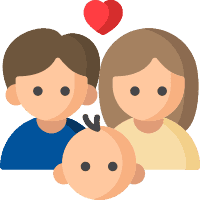The first day of first grade can be a significant moment for kids. Preschool and kindergarten are fully behind them, and the transition towards more rigorous academic-focused learning has begun.
But how can you be sure your child is ready for first grade? That’s the concern that many parents have as Kindergarten concludes and the next level of learning appears on the horizon.
Most school districts and educational institutions will establish specific benchmarks to guidelines designed to help parents and educators get your child ready for first grade. Knowing what those social, physical, and academic goals can help parents know when a little bit of extra help or guidance may be needed.
Getting Your Child Ready for First Grade
It’s essential for parents to remember that every child is different and your kiddo is certainly unique! These benchmarks and guidelines are usually agreed on by educators and experts as necessary prerequisites for continued academic growth.
First grade represents a new level of rigor in structure learning–so getting your child ready for first grade is critically important!
Speech and Language Skills for First Grade
Experts tend to agree that your child will be better prepared for first grade if they have developed sufficient language skills before the first day of class. These skills will make it easier for your first grader to learn, process, and synthesize new information as they progress through class material.
Speech and language benchmarks often include:
- The ability to parse information about stories: For example, can you first grade identify elements of the plot or setting when listening to a story? Can they point identify the who, what, when, why, and where in a story with and without associated pictures?
- Continued use of Producing complete complex sentences: Communication will be essential in the first grade. If your child is using complete sentences often, that could be an indication that certain speech and language skills are developing at a healthy pace.
- Information retention and repetition: Before entering the first grade, your child should be able to hear a story and then repeat elements of it back to you. Memorization is far from necessary, but look for the ability of your child to summarize the beginning, middle, and end.
- Listens and discusses with interest: Your child should be able to listen to information in reasonable durations with interest and be able to ask questions afterwards. For example, if you read a story to your child, they should be able to participate in a relevant conversation afterward.
- Performs basic language tasks: In general, your kiddo should be able to recognize rhyming patterns, be able to ask questions, and speak clearly to communicate requests and convey meaning. Your first grader-to-be should also be able to identify letters and words (though not necessarily read them) and construct some meaning from textual and picture-based clues.
- Knows basic information: Your child should be able to recite their birthdate, address, and phone number upon request
Social Skills for First Grade
Educators and administrators will look for your child’s ability to demonstrate certain behavioral capabilities and social skills. Every first grader is different, of course, but in general educators would prefer that your child can:
- Work and play with others: This includes learned social skills, such as sharing. Your child should be able to generally work and play well with other children.
- Know how to follow rules: The ability to follow rules and routines is essential to success in a structured learning environment, such as school. Whether your child chooses to follow the rules is one thing–but they should know how.
- Respects the feelings of others: In most cases, educators like to see the demonstration of empathy skills before first grade begins. Showing the ability to respect the feelings and boundaries of others, therefore, is absolutely critical.
- Demonstrated ability to pay attention to one task for a sustained period: There will be plenty of distractions in first grade! So if your child can demonstrate the ability to pay attention to a single task for a sustained (but reasonable) duration, that will be a good sign that your child is indeed ready for first grade.
Occupational Therapy Skills
Parents who are concerned about getting their child ready for first grade are also usually directed towards some common occupational therapy skills. These benchmarks could include:
- The ability to handle writing instruments: Your child should be able to grasp and control various writing tools, such as crayons, pencils, and pens. Coloring with crayons or markers can be a great way to practice this skill. In addition, finger painting when seated or in the prone positions builds hand strength and skills with holding writing tools.
- Demonstrated capacity to write familiar words: Your child does not need to know how to read and write (that’s what first grade is for, after all). But the ability to write certain familiar words–such as their name, for example–is usually a solid benchmark to aim for in your first grade prep.
- Left-to-right and top-to-bottom skills: Your child should be able to understand basic left-to-right and top-to-bottom progression. This will help in the development of both reading and math skills.
Talk to an Expert
If you have concerns about first grade–or want to better understand how to help get your child ready for first grade–you can always talk to an expert. The speech language pathologists and occupational therapists at The Center for Speech & Language Development can help you determine whether your child meets common academic and social benchmarks or might need a little bit of helpful practice in certain areas.
To talk directly to a speech language pathologist, contact us to schedule an appointment at our Chicago area office!



